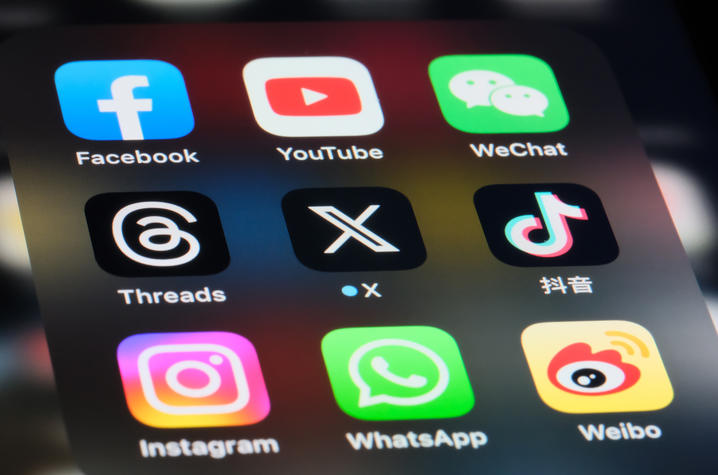‘Behind the Blue:’ Experts discuss social media’s growing influence on politics

LEXINGTON, Ky. (Nov. 4, 2024) — In today’s political landscape, the power of a single post, tweet or video can shift public opinion, drive movements and even shape policies.
From trending hashtags to viral tweets, social media isn’t just an accessory in politics anymore — it’s a microphone, a platform and, at times, a battleground.
But how did we get here? And where is this headed?
In the social media arena, candidates and voters engage in real-time debates, raise awareness for causes and rally support. But as its role in politics continues to grow, so do questions about its influence.
On this edition of “Behind the Blue,” Maggie Macdonald, Ph.D., assistant professor of political science in the College of Arts and Sciences, and Annelise Russell, Ph.D., associate professor in the Martin School of Public Policy and Administration, explore the impact of the stories lighting up our feeds — and what they mean for the future of democracy.
“We’re in a moment where everything is digital. Politics is no longer just door-to-door, pamphlets or what we see on TV — it’s tweets, it’s Instagram stories, it’s TikToks,” Macdonald said. “This shift presents both opportunities and challenges for those aspiring to engage in public policy or communication fields.”
Amplifying voices, shaping opinions
Through their individual research, Macdonald and Russell explore the complex relationship between social media and politics — unpacking its benefits, pitfalls and what it truly means to be “political” in the digital age.
Both agree, social media has given rise to citizen activists and journalists who use these platforms to rally support for issues that may otherwise go unnoticed.
“The democratizing potential of social media is profound,” Russell said. “It gives individuals the power to speak directly to large audiences without the traditional gatekeepers.”
Macdonald agrees, noting, social media allows for more diverse narratives to enter public discussion. Additionally, politicians and candidates can use the various channels to speak to diverse audiences.
“Social media offers a menu of different audiences for a campaign,” she said. “But on social media, they simultaneously can try to focus their attention on the people on the platform, but they also recognize that everything they say is on the internet and can and will be used against them at a later date. And so even though it’s relatively cheap to write a tweet, there’s also potentially reputational costs that come from it.”
Challenges of misinformation, polarization
However, the rise of social media in politics comes with significant challenges, including the spread of misinformation and the polarization of political discourse.
Russell and Macdonald also recognize the darker side of this new reality.
For example, the viral nature of social media often means that misinformation can spread faster than corrections.
“In the race to get information out quickly, accuracy sometimes takes a backseat,” Russell said. “This can create a dangerous environment where false narratives gain traction before they’re debunked.”
“There are studies that show, the spread of an initial article that false information in it, then the spread of the fact-check article. The fact-check article will not go nearly as far as the first one,” Macdonald added. “And so, this is a phenomenon not just for politicians, but also for media. It’s unlikely that someone sees the initial offending post, then sees the fact-check afterwards.”
Macdonald says the algorithms governing social media platforms can create “echo chambers,” where users are predominantly exposed to viewpoints that align with their own — deepening ideological divides.
“We have so many opportunities to receive information, but also there’s so little oversight, and anyone can claim to be a political influencer and provide information,” she said. “It’s up to us to be our own first line of defense — to determine what information is trustworthy.”
A call for responsibility, the path forward
Ultimately, both experts believe, addressing these issues requires a collaborative effort from platforms, government entities and users.
“People need to be taught how to critically assess the information they encounter online,” Macdonald said. “A better-informed public can help counteract some of the negative effects of social media on politics.”
“When you’re consuming news and information read horizontally, not vertically,” Russell added. “Read across a lot of different sources.”
In an era where a single post can sway public opinion, the influence of social media on politics is undeniable.
Russell and Macdonald agree, whether it becomes a unifying force, or a source of division, may depend on the steps taken to ensure responsible use and engagement.
“Social media is neither wholly good nor bad,” Russell said. “It’s a tool, and like any tool, its impact depends on how it’s used.”
You can hear more insights from Macdonald and Russell by clicking the play button above.
About “Behind the Blue”
“Behind the Blue” is available on iTunes, Google Play and Spotify. Become a subscriber to receive new episodes of “Behind the Blue” each week. UK’s latest medical breakthroughs, research, artists and writers will be featured, along with the most important news impacting the university.
Transcripts for this or other episodes of “Behind the Blue” can be downloaded from the show’s blog page.
To discover what’s wildly possible at the University of Kentucky, click here.
As the state’s flagship, land-grant institution, the University of Kentucky exists to advance the Commonwealth. We do that by preparing the next generation of leaders — placing students at the heart of everything we do — and transforming the lives of Kentuckians through education, research and creative work, service and health care. We pride ourselves on being a catalyst for breakthroughs and a force for healing, a place where ingenuity unfolds. It's all made possible by our people — visionaries, disruptors and pioneers — who make up 200 academic programs, a $476.5 million research and development enterprise and a world-class medical center, all on one campus.




